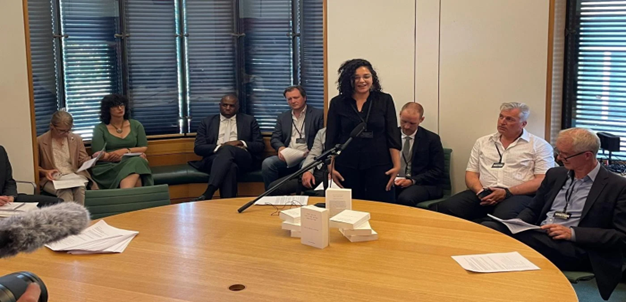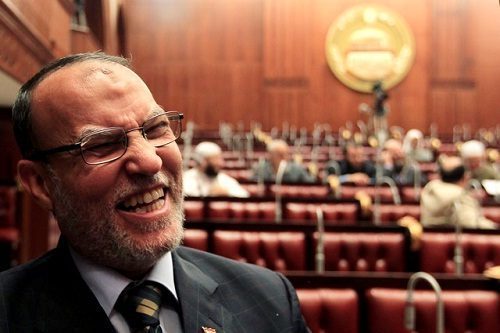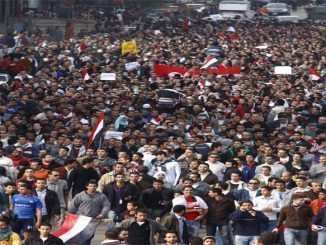
Judi Dench, Emma Thompson, and Carey Mulligan are among the signatories to a letter to Liz Truss and the US Secretary of State Antony Blinken.
The Hollywood stars urged US and UK to help secure release of the Egyptian activist Alaa Abdel-Fattah who has recently acquired British citizenship while in prison.
More than 1,000 celebrities have urged UK Foreign Secretary Liz Truss and her US counterpart Antony Blinken to use their “diplomatic power” and help secure the release of the Egyptian-British political prisoner Alaa Abd el-Fattah.
Actors Judi Dench; Carey Mulligan; Bill Nighy; Mark Ruffalo; Riz Ahmed; and Olivia Colman were among the celebrities who signed a letter calling on the two countries to “unequivocally condemn” the 40-year-old’s prolonged detention in Egypt.
Khalid Abdalla, an Egyptian-British actor who will play Dodi al-Fayed in the upcoming season of Netflix’s The Crown, launched the letter at a press conference at the UK’s parliament on Tuesday.
“A whole host of names who are the pillars of our cultural landscape around the world have signed this letter in support of Alaa,” he told Middle East Eye during the event.
“They are demanding his freedom and asking Liz Truss to do something about it. So far Liz Truss has done nothing.”
Abdel-Fattah has spent eight out of the last 10 years in jail on a range of charges.
The 40-year-old, who became a British citizen in April, is widely regarded as one of the most prominent youth figures in Egypt’s pro-democracy movement.
While in jail, in December 2021, he was sentenced to five years in prison by an emergency state security court on charges of spreading “false news”, in a trial widely condemned by human rights defenders. The evidence used against him was a retweet.
Among other high-profile figures to sign the letter was US activist Angela Davis; Nigerian poet Ben Okri; British film directors Steve McQueen and Mike Leigh; and Tanzanian novelist Abdulrazak Gurnah.
“We call upon you to use all diplomatic power to leverage the importance of your strategic relationships with Egypt to secure [Abd el-Fattah’s] immediate release,” the co-signed letter urged Truss and Blinken.
The British Egyptian started a hunger strike on 2 April, protesting against Cairo’s refusal to allow him access to the UK embassy and provide other basic rights.
“Imagine… you are in prison abroad for sharing a Facebook post, given five years in prison, and the foreign secretary of your country hasn’t said a word months later,” said Abdalla, who has known Abd el-Fattah for over 25 years. “Imagine what precedent that sets for other British citizens.”
Sanaa Seif, Abd el-Fattah’s sister, said that it was “heartwarming” to see the level of international solidarity with her brother’s case.
“I hope this letter will trigger more interest with the FCDO [Foreign, Commonwealth and Development office] so we can meet with Liz Truss,” Seif said, according to Middle East Eye.
Also at the press conference Seif said: “Today marks the 74th day of Alaa’s hunger strike, my brother is slowly dying in his prison cell, but he wants to live.”
“He misses his life, he misses his job, he misses his son, and us.”
“We’re deeply puzzled by the way we’ve been treated by the Foreign Secretary, Liz Truss. Why hasn’t she met with us? Why has she still not made an official statement about Alaa? I can tell you it hurts.”
“Alaa is slowly dying and hopefully we can save him, I know we have a window of opportunity to save him.”
“How it could be resolved is a high-level call from Prime Minister Boris Johnson, but also followed with firm negotiations from the Foreign Secretary.”
The press conference follows widespread coverage of Alaa’s plight in British media outlets and calls for action made by several politicians including Labor MP Zarah Sultana who sent a letter to Liz Truss lamenting the British government’s close ties with the Sisi regime.
In December 2020 Hollywood star Scarlett Johansson called on the Egyptian authorities to release three senior staff members of the Egyptian Initiative for Personal Rights who had been jailed the previous month after meeting with European ambassadors to discuss the human rights situation in Egypt.
The staff members were released shortly afterward leading several Egyptians to conclude that the solidarity message helped bring about their release.
60,000 Political Prisoners
According to Human Rights Watch, “Since the 2013 military coup, Egyptian authorities have arrested or charged probably at least 60,000 people, forcibly disappeared hundreds for months at a time, handed down preliminary death sentences to hundreds more, tried thousands of civilians in military courts, and created at least 19 new prisons or jails to hold this influx,” the rights group stated, adding:
“The primary target of this repression has been the Muslim Brotherhood, the country’s largest opposition movement.”
Human Rights Watch found that the Interior Ministry has developed an assembly line of serious abuse to collect information about suspected dissidents and prepare often fabricated cases against them.
This begins at the point of arbitrary arrest, progresses to torture and interrogation during periods of enforced disappearance, and concludes with presentation before prosecutors, who often pressure suspects to confirm their confessions and almost never investigate abuses.
The former detainees said that torture sessions begin with security officers using electric shocks on a blindfolded, stripped, and handcuffed suspect while slapping and punching him or beating him with sticks and metal bars.
If the suspect fails to give the officers the answers they want, the officers increase the power and duration of the electric shocks and almost always shock the suspect’s genitals, in addition to other types of torture.
Since the military unseated former president Morsi in 2013, the authorities have reconstituted and expanded the repressive instruments that defined Mubarak’s rule.
The regularity of torture and the impunity for its practice since 2013 has created a climate in which those who are abused see no chance to hold their abusers to account and often do not bother even filing complaints to prosecutors.
Between July 2013 and December 2016, prosecutors officially investigated at least 40 torture cases, a fraction of the hundreds of allegations made, yet HRW found only six cases in which prosecutors won guilty verdicts against Interior Ministry officers.
However, all these verdicts remain on appeal and only one involved the National Security Agency.



